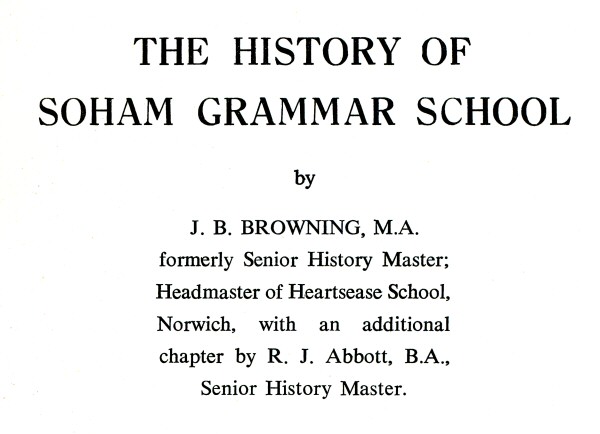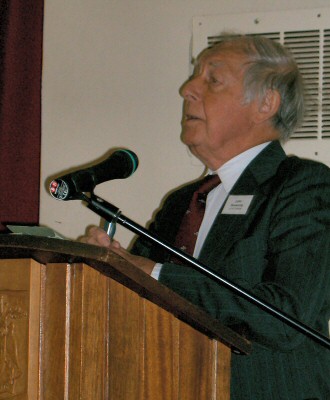
John Browning, about to press
the
audio-visual remote control?
Oscar Wilde, who I think was a master of epigrams, produced this one “I could deny myself the pleasure of speaking but not others the pleasure of listening” and that is the sort of comfort that people like myself take on occasions like this.
| This
early period in our lives, those days are formative,
they are influential. My first twelve years were
spent in Northumberland, I’m a Geordie lad - I
don’t sound like it now but I used to - from a
Geordie village and there I spent the years from 1921
to 1933, so if your mental arithmetic is up to it,
you’ll have gathered I am 87. Thank you very
much [applause] In 1940 I went to Oxford. Oxford laid its spell on me which it has never lost. If Oxford broadened my horizons, I can assure you that the Army, for which I volunteered in 1941 really taught me that I knew nothing at all. We had to learn how to obey, we had to learn discipline, responsibility. If you were in a position of responsibility you had to learn to command and you had to learn that above all you had to earn respect. And we all prayed "Please God, let me survive". |
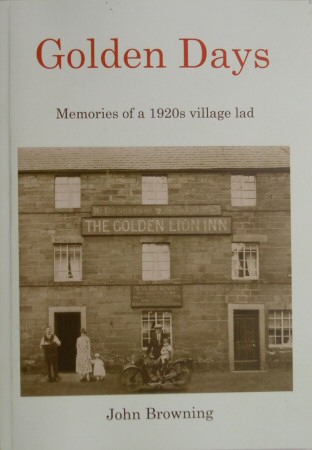 |
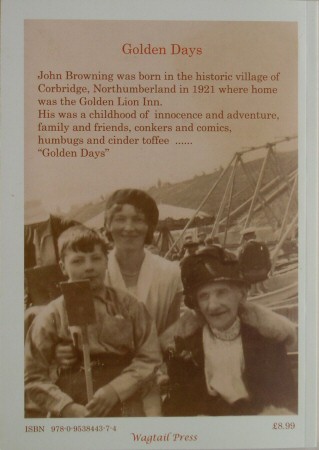 |
If you wish to purchase a copy of this book please call 01603 425641 |
||
And with those who did survive I went back to Oxford in 1946. The winter of 1946-1947 was grim in the extreme, not just because it was b cold but because everything was on ration. When they talked about power cuts you said what is power – because we hadn’t had any! No heating, and so we used to repair to the college libraries, not just because they were the source material but we used to get together and make use of what I think is called ‘corporate body heat’. And there we huddled in our service greatcoats, and looking round it reminded me of being in the officers’ club on a Saturday evening.
And then in the Spring of 1947 I came to my senses. I had to do a job. The dreams which I had of being a Colonial Officer, mounted on horseback, dispensing British justice in the far-flung outposts of the Empire had vanished. In 1947 you will recall India was declared independent and there wasn’t an awful lot left of the dear old British Empire. So what would I do? Well, with the Empire crumbling I wouldn’t be a Colonial Officer: I was then a married man with two children and I had just been restored to their bosom and I was certainly not going to leave them again. And so I decided on teaching.
Years later at a college reunion one of my contemporaries said “Teaching? That’s not very adventurous Johnny.” I said in reply “If you had ever taught a fifth year D stream with Gold and Porritt in there, last lesson on a Friday afternoon, believe me you would have known what adventure was all about!” [laughter]
| Like all
of us we had to relate where we lived to where the
job is, or where the job is to where we lived. We had
been granted or allocated a house on a large council
estate just outside Cambridge, at Trumpington, so a
job had to be somewhere close at hand. Soham was only
25 miles away, so I applied and in their great wisdom
they invited me for interview. I don’t think I shall ever forget that interview. I went in, it was composed of a group of the governors, some from County Education Committee, a man called Edward Armitage and the chairman was Ted Leonard who I was assured was the local butcher, chairman of the Governors. The first thing he said to me was “You know, Mr Browning, this is a school with a rural bias”. So I nodded - I didn’t know what else to do. Then he said “What’s your qualifications?” So I said “Well, I’ve got an Honours degree in History from Oxford University”. “Yes” he said “but have you got Matriculation?” [laughter] That’s when I decided I had come to the wrong place. I looked up and I saw Edward Armitage’s right eyebrow twitch and I thought “this is it.” |
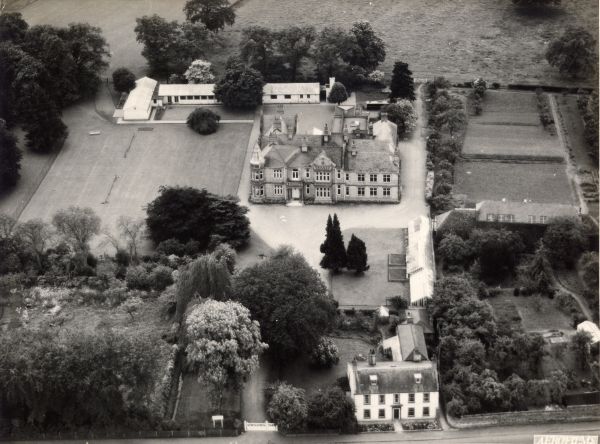 Soham Grammar School, early 1950s: The Nut Walk was off to the middle left |
Of the rest of the interview I haven’t got the faintest recollection of who said what or why. At the end of it I was offered a post to come and teach at Soham Grammar School. Three things decided me that I should do it. The first was what you see in front of you – Beechurst – I thought what a noble, graceful building it was (and is) in which to start my teaching. The second thing was the Nut Walk, can any of you remember that? Good, hooray – I’m sure some of you thought poor old chap, he’s dreaming, 87 [laughter]. I had 20 minutes in the Nut Walk before I went in. If I had known what was ahead of me I think I would have had 30 minutes. But I thought a school which has got something like that … And then I had some words with Edward Armitage. I must say that Edward struck me as the sort of chap that I would like as my first headmaster.
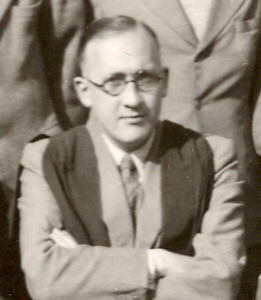 1946 |
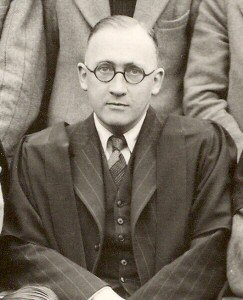 1949 |
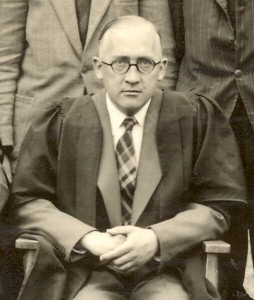 1952 |
And so in September 1947 I came to this school. I can’t really believe that that was 61 years ago. Some of you here tonight were there when I came and I’ll deal with you lot later [laughter]. Sixty one years on here I am and I’d like to pay tribute to Edward Armitage [applause]. I was a head for twenty five years so I know something about it, not all my staff would agree with that, but they are not here tonight and they’d be told to keep quiet if they were.
I remember Edward as a man who seemed rather like a swan – paddling like hell below but serene all above. He was unflappable, unflustered and I don’t remember in the four years that I was here that he either lost his temper or even lost his patience. His headship was, I think, a marvel of the unobtrusive, and by gum it had to be with the rumbustious lot we had in the Staff Room, I can tell you that - some of you may remember them as I did.
On Saturday afternoons I used to play for Cambridge Town Rugby Club - more important than where I am on this photo, is where Dickie Jeeps is: REG Jeeps who many of you remember played for England and was a British Lion, is on the front right hand side.
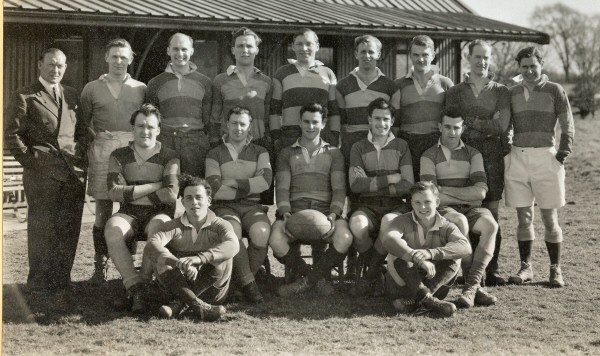
Cambridge Town RUFC 1949-50: JB middle row, 2nd left: Dickie
Jeeps front, right
source: Browning
I had to go to the Head to ask for an afternoon off and I was quite certain he would say “Oh jolly good, Browning, what an honour, what a tribute” – no flipping fear. I had to argue slightly with Edward. “Well Browning we don’t normally do this” sort of thing. Anyway he did and I am sorry to tell you that Cambridgeshire, for whom I was playing that afternoon, was well and truly duffed up … no fault of mine [laughter].
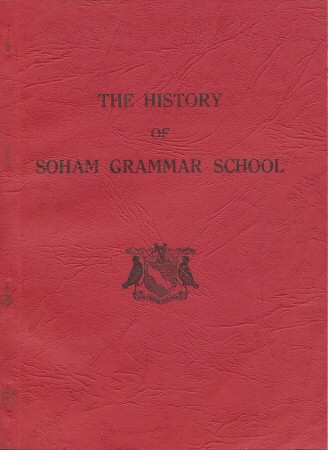 |
|
The History. 1951 was the Festival of Britain. In connection with that Edward suggested that I gather together some documents to do with the history of the school and put them on display, and this I did. I wasn’t quite prepared when he then said “Browning, while you are about it, why don’t you do a history?” Well I did. I had to make penance to my wife because in our council house at Cambridge there were documents scattered all over the place. Eventually I did it. The final chapter was done by a later History master, but the majority is down to me – culpa, mea culpa, maxima culpa. Some of you I know have bought it, and I hope you have enjoyed reading it.
So Edward was a man whom for four years, first of all was my head and then as a role model - a very fine one indeed – I pay tribute to him, and associated with that, May, who I did know, a wonderful lady whose death we all regret.
| Jack
Symmons: when I came to the school in 1947
Jack Symmons was in charge of History, the words
‘Head of Department’ were not then
employed. The first thing he said to me was “I was at Bristol University and I came across a young lady called Miss Browning”. I said “Yes, that was my sister.” So we were in total empathy right from the start. I have to say I couldn’t have had a better or more helpful mentor in the first year than I did with Jack. He departed at the end of the year for Arnold School in Blackpool. He was replaced by someone I shall be referring at some length later on. |
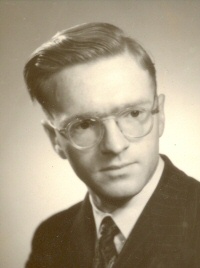 Jack Symmons: History 1944-48 |
When I came as a young sprog to school, and I wasn’t all that young, there were four chaps in the Staff Room who had obviously been there for some time – we called them the Big Four and the first of these four was Geoffrey Johnson known to some of you as Bish, known to us as Juggers or Jugger.
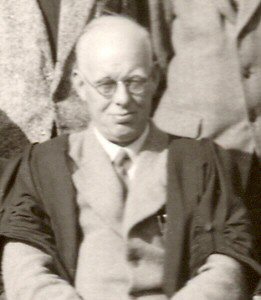 1946 |
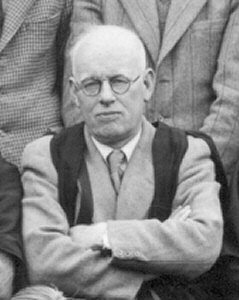 1949 |
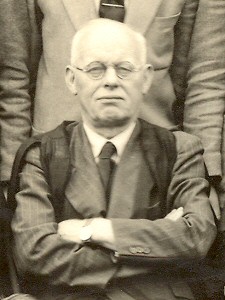 1952 |
There he is, always wearing glasses, perched on his nose. If you wanted to start talking about anything, then make it West Bromwich Albion [laughter]. He was a benevolent influence in the Staff Room, and you needed one, I can tell you. Some of you may remember that he used to walk around the school with a case. When I was a lad in the North it was called an attaché case. And, so the story goes, I can’t vouch for the veracity of it, at some stage during the day, he would lift up the lid, inside was a thermos flask of coffee, he would help himself to a cup and suitably fortified and making sure that the boys had their noses to the desks, he would carry on. Can any of you remember that? [Yes].
He wrote poetry. Now I do love poetry but I have to say that I have never read any of Jugger’s for which I am very sorry, for I do remember him with great fondness.
Rees Thomas, known to you I am sure as to us, as Taffy. Shorter than I, and like me in his time he played rugby. He had a Gallic with and we had lots of that. He reminded me of the character from Listen with Mother [John, no, it was The Magic Roundabout] - was it Zebedee? - who bounced about on springs, and that’s how Taff used to go around the Staff Room, I can assure you, as well as around the school.
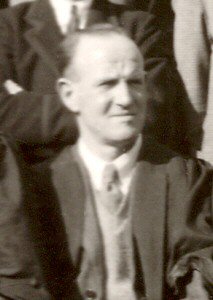 1946 |
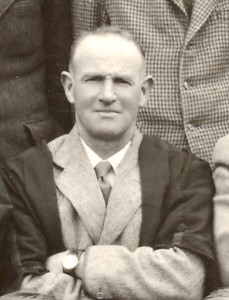 1949 |
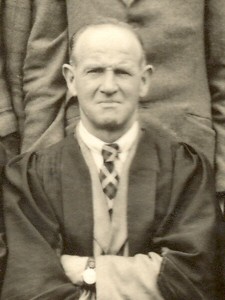 1952 |
I know that in teaching Geography he felt the two essentials were a globe and a long stick [laughter]. On one occasion, so he told us, he was teaching and the door suddenly burst open and the Head of the day – not Edward - came in. He came up to Taff and said “Where’s Bloggs?!” Taffy, somewhat unnerved, pointed to Bloggs who was in the back row. The Head marched up to him, glared at him, seized him by the lapels of his blazer and either vigorously or violently shook him five or six times, glared at him again, turned around, went out, slammed the door. And as Taffy said “I never knew from that day to this what it was all about.” [laughter]
Taff was a wonderful experience to have about one. He made the young, newly joined members feel very much at home. I remember his dear wife Barbara with equal affection.
George Hunt. Capability George, I used to call him. He caught on to the particular resonance of that. There’s no doubt about it that the rural bias which Ted Leonard referred to was thoroughly justified. George taught Rural and Agricultural Science to a very high standard indeed and many went on from this school to wonderful things because of the start that George had given them. He was also rather short, broad and not given to many words - and most of his words were preceded by [throat clearing noise?]. Yes, you remember. But you won’t know this story, which came out of the blue and completely out of character. One afternoon in the Staff Room he told us a simply marvellous story about two girls on bicycles, with such vivid and startling detail I dare not tell you even if there were not ladies present. [laughter] But I expressed to George a certain amount of dubiety about it and he claimed – metaphorically speaking only – that he had first hand knowledge of this, and so I simply said ‘naughty old George’ and left it at that. Years later when I was at Weston super Mare, George had retired to Wedmore and one afternoon I was out in the car with my wife and I said “I know that chap over there” and walking along, still fairly spry, was George. Well you can imagine I got out and we had a wonderful chinwag with many dry asides that George was known for. A wonderful man. |
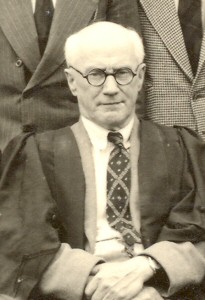 George Hunt: Rural Science 1926-1952 |
| Charlie.
What a wonderful man. He taught Chemistry and other
things. I always remember he was the chap who was
responsible for the timetable and so made sure you
got free periods or not and he also had complete
charge of the examination system from the receipt of
the examination papers, their storage, their
security, disbursement where necessary and arranging
the timetable itself. He looks a little bit solemn
there but I always remember him as being a man of
really cheerful and smiling countenance. I know because on one occasion I had the evidence to prove it, that he kept pigs. On this occasion I saw him, he had his gumboots on and swill buckets in his hands, he was off to feed his pigs. I assure you from personal experience that the bacon and the pork sausages produced from those pigs were absolutely beyond compare. He made us extremely welcome and I had nothing but happy memories of John. I should say at this stage, years ago nobody in the Staff Room ever addressed his colleagues in the Staff Room by their Christian name – it was Riley, or Hunt, or Johnson. But in time this loosened up, perhaps these dreadful newcomers helped it, but I used to call him John and he called me John. His closest friend I think was Taff Thomas and he used to call him on occasion ‘Oz’ – do you know why? No. Well we never found out, it’s another one of those mysteries of life. [laughter] |
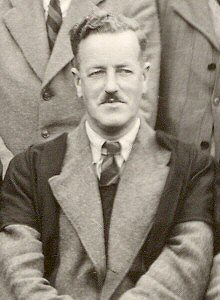 Charles John Ford: Chemistry 1926-1964, also Botany, Zoology |
Riley. ‘Plus one’ we used to call him. Thomas Luke Riley. Now quite honestly I can never recall, never had it explained to me why he was known to the boys as Slug, which I believe he was. He did not look like a slug around the Staff Room or around the school. He was alert, he was quick and he always had that smiling face, you remember it? [laughter]. I tell you, in the four years I knew Luke, which is what we used to call him, I never remember hearing him laugh [laughter].
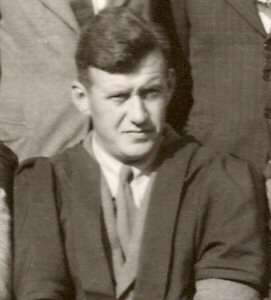 1946 |
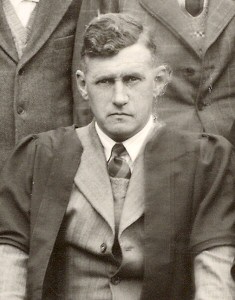 1949 |
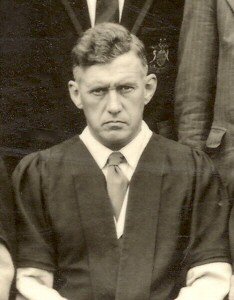 1952 |
Now Luke had been in the army like me, served in Normandy, in the 43rd Wessex Division which I knew well, but for some reason Luke did not like officers. He knew I had been an officer so I had hell on certain occasions. On one of these I did respond - I don’t know whether he was a fly fisherman but he dangled this one nicely and JB rose to it. He said “Sheffield University is the place where all the really clever boys go whose parents haven’t got the money to send them to the snob universities.” [laughter]. So I said “Luke, in 1940 I went to Oxford from a grammar school. My father was a horse box driver, my mother was bringing up the family on £2 a week housekeeping. I don’t think you can say we were rich.” We never followed beyond that to discuss whether or not I was clever! Behind that solid Yorkshire exterior there did beat, believe it or not, a heart of gold.
| I couldn’t
believe this when Frank showed it to me. I said who’s that and he said it’s Luke Riley. He must have been able to unbend, because there he is in all his glory as an Aunt Sally. |
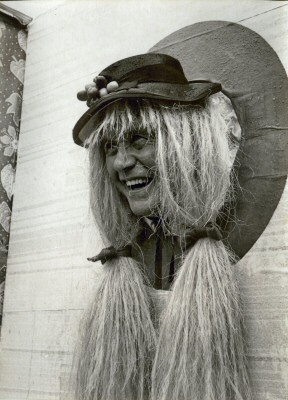 TLR as an Aunt Sally, School Fête 1968 |
| Henry
Major Twiselton. From the way he treated us
it should have been Major Henry Twiselton. [laughter]
He lived in Bateman Street in Cambridge. Now Twissy,
as we called him, was a Senior Wrangler and that
means he really did know his stuff. I have no idea
what his teaching was like but I believe, like the
BBC later on, he used to have Thoughts for the
Day, which he used to reveal to the Staff and
the boys, who no doubt welcomed them on every
occasion. He used to refer to Edward Armitage, for
whom I had a very high regard, as “that funny
little man downstairs” [laughter] . Twiss did not exactly cover himself in glory, and in all honesty if Twiss were here I would say to him as I said on occasion “I don’t really know why you are at Soham Grammar School”. He really didn’t fit in at this school. Occasionally he gave a lift to Francis Catala and myself to school. He had a blue car, I don’t know why I remembered it, the registration was PO - which I thought was really very clever [laughter] - 4152. Twiss was very much a character on his own. |
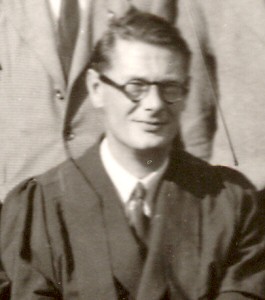 Henry Major Twiselton: Maths 1945-51 |
| EHT or Tabby
Tabraham. He looked exactly then as he did when I saw him again in 1972 when he was deputy head. Like me he had a serious hair shortage. He was of a frank and open disposition. I enjoyed his company. He taught woodwork and I’m sure metalwork, the subjects were just emerging from the education mists when they were know as, believe it or not, as MI - Manual Instruction [interjection – “and Gardening”] - well that was another string to his bow of which I had no knowledge. |
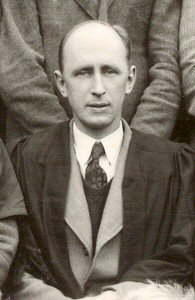 1949 |
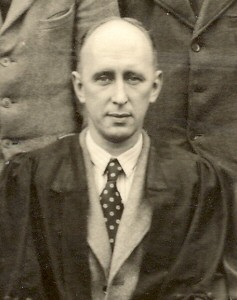 1952 |
| SR
Saunders. We always called him Stuart. I
gather you knew him as Sid. He was born a
gentleman - I do mean this seriously - he was
educated as a gentleman at Tonbridge Public School. I
have met enough public schoolboys to know that they
are not all gentlemen - some of them were high class
rogues - and not all gentlemen, to give them credit,
did go to public schools. He was always the acme of good manners. I don’t think I ever met a more courteous man in my life. In my day he taught Religious Education: later on I believe he taught a number of other subjects. He had a habit of [grasping and adjusting] the lapels of his jacket - can you remember that? Yes. I remember him and his dear wife Marion who lived in Ely very clearly indeed. |
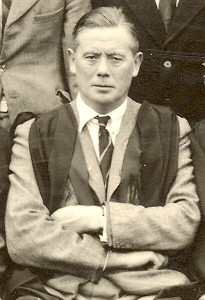 Stuart R Saunders - Sid - 1947-66, RE, Latin ... |
| Dickie Dunning was here in charge of Art, Pottery and Craft, I am surprised that it was all of that. He went after I had been here a year and I think that photograph sums him up – a very quiet and undemonstrative man indeed. I did not get to know him very well. | 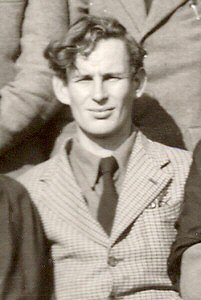 RW Dickie Dunning: Art, Pottery & Craftwork 1945-1948 |
| He was followed by Ken
Drake, who had been a pupil at the school. I
admired his courage in coming back to where he had
been educated. I don’t know why I should have
done that because I did exactly the same thing
myself, returning to Salisbury. Ken and I did not meet each other much, he was one of those industrious heads of department who did not appear in the Staff Room very often so I can’t say very much about him. |
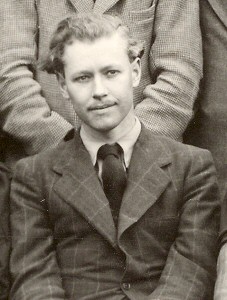 1949 |
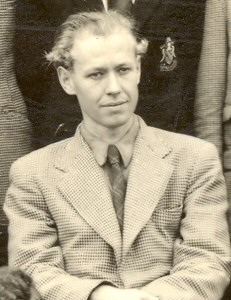 1952 |
| Dick
Meneer. I don’t know if any of you came
across Dick, or Dick came across you. He was only
with us for a very short stay but he impressed all of
us. He taught Latin and he had a real fund of
hilarious stories from his time in Australia. Now its very odd, I was here four years and I know that schools cannot exist without staff meetings. I never remember a single Staff Meeting in Soham Grammar School except one, at which Dick was present. He got a bit impatient and he suddenly stood up, he used to help himself up with a big stick, which he banged on the floor and said “I’m off!” and he just disappeared [laughter]. I looked at Edward, he just took it in his stride and carried on [laughter] – what could he have done? |
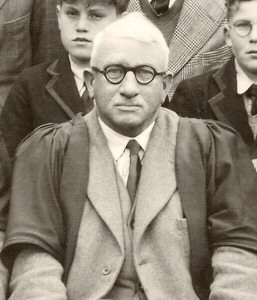 Mr Meneer, Latin, Spring-Summer 1949 |
| He was followed by Rex Waller. When he came he was a very pleasant, fresh faced, open man and I enjoyed his company. I was very sad when I learned he had moved to Sexey’s School, Bruton. Now let me explain, Sexey’s was spelt S-e-x-e-y, just in case you thought otherwise [laughter]. It was just down the road from Weston Super Mare and sadly we never met but we did meet on occasions such as this for reunions and I am very sad indeed that he can’t be with us today. | 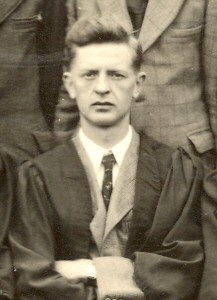 Rex Waller: Latin 1949-1960 |
| Ted Quinn.
[roar of applause for Ted, who was present] I
remember him and his dear wife Kathy. I had a certain
sympathy for him because I was a true Geordie and to
a true Northumbrian Geordie anything on the other
side of the Tyne is foreign territory. Ted got his
degree at Durham. I felt very sorry for him
[laughter] but I don’t think it made much
difference. |
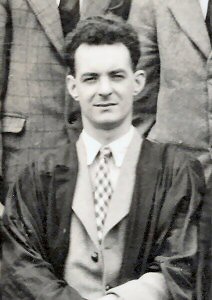 Ted Quinn: Physics 1950-1956 |
| FK Webb. He lived in Cambridge but he made his own way here. He taught various science subjects, all to me arcane and purely intangible. So broad were his talents that he was invited to join a government department at Malvern. | 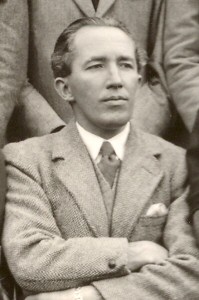 FK Webb: Science 1948-1957 |
| What I
would like to do now is to deal with two people, one
of whom you'll want to know about. There they are in
their glory. The point I want to emphasise here is that we were wearing gowns, I am sure that all staff in your day wore gowns, but in the last 20 years of my nearly 40 years of teaching I can tell you gowns disappeared, only brought out for Speech days which became rather politically incorrect and you had to have Award Days. Morning assembly was held in what was the Conservatory and we used to be in there, hugger-mugger, the staff on the platform and my dear friend Francis Catala used to accompany seated at the mighty Wurlitzer tucked away in the corner. [laughter] |
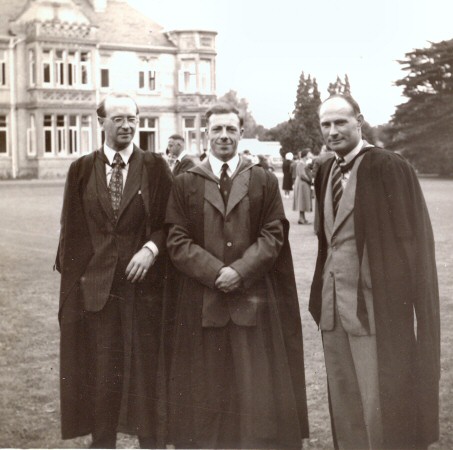 1951 - Francis Catala, John Browning and RAT |
| Form IIA
1947-48 No one explained to me why the
Reception year as they call it now, the first year,
why it was IIA and not IA, as I believe it became
later. Looking at those names I am not going to
mention more than one or two, but I can close my eyes
and see most of them now. Their importance was this. They were the first of the elite youth of this country that I faced, some 30 of them. It took me back to my days as a very junior subaltern, when I was taken out of the line by the Company Commander and sent to thirty scruffy, pimply, bristly blokes “This is Second Lieutenant Browning, your new Platoon Commander”. They couldn’t believe what they were seeing and by God, neither did I [laughter]. So I had to recall to myself that having faced the brutal and licentious soldiery I could think to possibly face the elite youth of Britain. These lads had something to do with it. I think of Reggie Brown, he covered himself with glory. I set the form a composition My first day at Soham Grammar School. He wrote ‘Our form master is Mr Browning and he is a very nice man.’ Reggie got 10/10 [laughter]. He deserved it, didn’t he, for his perception? Then there was Butcher, JB. John Brian Butcher. I said to him “Butcher, with initials like that, JBB, you can’t go wrong, I forecast a wonderful future for you.” I was right, was I not? |
|
Murfet, ED (as distinct from Murfitt OC) known as Duffy – I recall him because he used to draw the ground plan of cathedrals on the back of his ruler. That was what was called in our days as creepy … you see he knew Browning was interested in history.
On certain afternoons in Summer we used to go by coach to Newmarket Baths – you remember that? – for swimming. On the coach I was accompanied by my dear friend Francis Catala. Donald Spanton , known I think as Spanno, suddenly gave forth on a Teresa Brewer song Put another nickel in the Nickelodeon. If you remember that, I do, it was such a catchy tune I had to sort of grit my teeth not to join in, not just the tune but the words.
But they [Form IIA] were very important, I do mean this seriously, because I think if I hadn’t found them such a delightful lot, I might well have sought other employment. Some of them are here tonight, I’m delighted to have met you – Mike Turner and John Waller of that IIA [they stand to receive applause]
| Form IVA
1947-48. I taught throughout the school and
when Jack Symmons went I also taught the sixth form,
but IVA was a super form. I remember David Bray, he
went on to Cambridge and John Fuller and AGS Taylor
… But best of all I remember them because one
morning Edward came up to me and said
“Browning” – I always knew that meant
something – “I’ve got one of His
Majesty’s Inspectors in today and he is going to
observe one of your lessons.” I thought, why me? I had had no warning whatsoever. It was first lesson in the morning and I had IVA for History, they had no warning. I have to say they responded magnificently. If any of them are present tonight, you are responsible for the fact that JB Browning was certified as a teacher and thereafter was inflicted upon 40 years of boys and girls! [laughter] I singled out those two forms but it does not mean that I thought any the less of the other forms that I taught. |
|
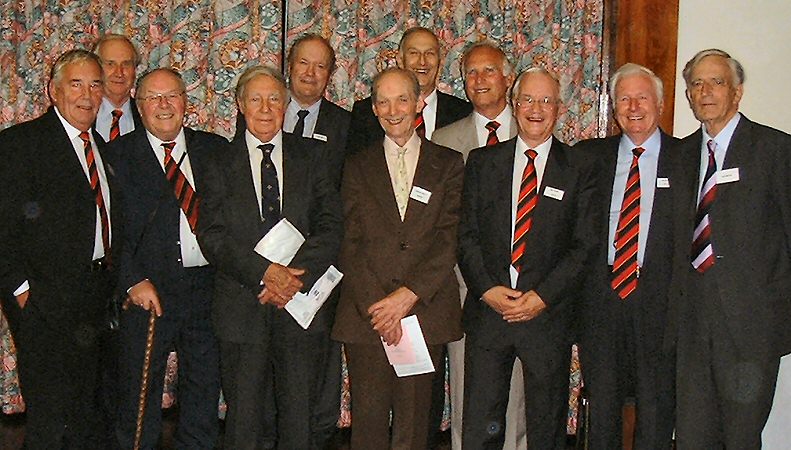
1948ers and friends at the 2007 Dinner
| Francis Catala.
A very good friend of mine. Francis was a graduate of
Gonville and Caius College Cambridge. His degree was
in modern languages. He taught English and French in
this school and also Music. I don’t know if any
of you received music lessons from Francis but in
those days he like many of us in those days suffered
from the fact we didn’t have the resources that
schools have today. If the right resources had been
here when Francis was here we would have turned out
some first-class musicians. He was a pianist of quite
outstanding ability, not quite Myra Hess but of
genuine concert platform quality. He lodged on the far side of Parker's Piece in Cambridge and in our first year at SGS I picked him up in my ancient Rover 10, AUL 629, which while not a speedster, in the end demonstrated a capacity to outpace my bank balance. When it gave up, fortunately Peter Taylor had returned to SGS and - this is the measure of the man - each day he would travel in from Linton to pick up Francis and myself and return us to Cambridge each day's end. While I was already standing by the edge of Parker's Piece, Francis not always on time was hastening across - and a vast area it was and is - in his own high-stepping way to the accompaniment of Peter's encouraging "Here comes the Chiswick Chick" (Francis had lived in Chiswick). |
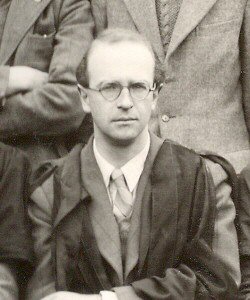 Francis Catala: English and French 1947-1951 |
We three were the best of friends: Francis always had some good fresh London story and Peter some highly amusing local anecdote to brighten and lighten our journey.
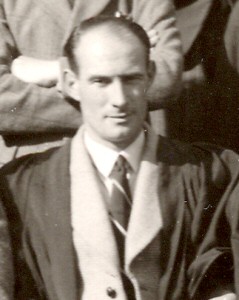 1946 |
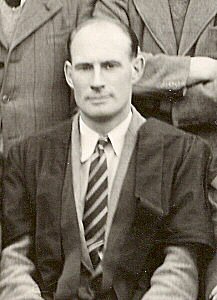 1949 |
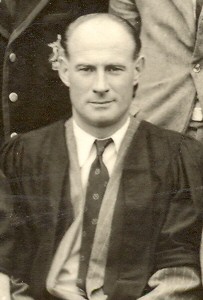 1952 |
Sqn Ldr Ronald Arthur Peter Taylor -RAT
RA Taylor - Peter Taylor to all who knew him on the Staff. Jack Symmons had advised me that his replacement - not quite correct because I replaced Jack taking charge of the subject - had some novel approaches to the teaching of History, drawing on the dramatic and the unusual. He quoted as an example of Peter's individual style the description of a siege which involved the scouring of the countryside for decomposing bodies of horses or cattle, which were then catapulted over the walls of the town to the consternation of the inhabitants.
He was never number two to anyone, not even to his beloved wife Tref. He joined me and we worked well together in full harmony.
Born and bred in Linton, he lived there all his life apart from two periods in Canada, had been educated at Cambridgeshire High School and admitted to Downing College, Cambridge. There he graduated in History, but his major interest and achievement lay in Soccer, gaining his Blue in three successive years against Oxford. His cricket was good enough to have put him close to another Blue.
| Some of you, I am sure,
will recall - may even have participated in -
momentous soccer matches between SGS 1st XI and
Newport GS 1st XI, the latter accompanied by their
coach, also named Taylor but known as Spud -
by chance, Peter's brother. A colleague in the Staff
Room urged me to watch one of these matches and I saw
why. The brothers stood on opposite touchlines and if
personal rivalry and hostility could have taken
physical form they would have shot across the pitch
like bolt lightning. At other times they were really
good friends. Oddly, though Peter had gained his Blue in soccer, it was on cricket that his great affection rested. The soccer pitch was of course important, but the cricket square was his pride and joy, nourished, protected and almost revered. On one occasion a few of us had a brief knockabout with bat and ball, thinking nothing of it, having been, in our view, well behaved. So it was something of a shock when Peter burst into the Staff Room in explosive rage. It appeared that some damage – it could not have been much, but it was sufficient – had been done to the sacred turf and he knew that some of his colleagues had been responsible. He did not know which – just as well. I cannot remember another occasion when every member of staff present found a book or newspaper of totally absorbing interest and attention. He cooled as he always did but he had certainly been in unforgiving mood. |
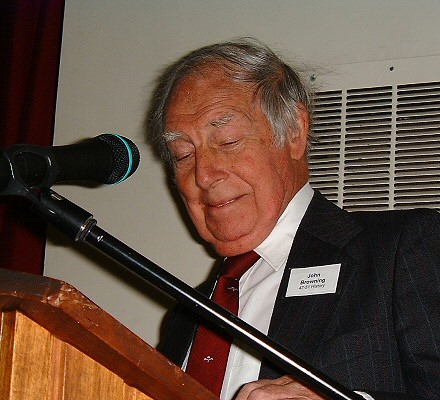 |
I remember vividly another manifestation of the Taylor explosiveness. It happened on the return journey from Soham to Cambridge. We had passed Lode and Stow-cum-Quy and emerged on to the Newmarket Road. A lorry driver showed less than due regard for the Highway Code and for Peter’s car. It was travelling towards Cambridge and Peter yelled “Right you ***** *****, I’ll get you for that.” He roared past the lorry and then settled the car just in front. It must have been Summer for his window was open and he thrust the mighty Taylor arm into full view, the fist curled and quivering waved menacingly at the lorry driver “Take that, you ***** *****!” he shouted, at which point I gently suggested that we should move on before the lorry driver took retaliatory action. We did, and as always, Peter cooled down. The incident was recalled in all detail producing bouts of joyful laughter among the three of us.
Some who were on the receiving end may remember the extended Taylor arm, which had a sort of galvanic energy to it, at the end of which was an extended, quivering index finger – he may well have been the begetter of the phrase ‘rigid digit’. He was nothing if not positive and emphatic.
No-one ever got the better of him in Staff Room verbal exchanges. I, as his nominal Head of Department, and our fellow traveller Francis, enjoyed immensely the generosity of his transport but also the pleasure of his company. The three of us had some wonderful joyous times together, some, which this is not the occasion to detail, were out of school in and around Cambridge. I believe it was Peter who suggested that I be the Guest of Honour at the final Speech Day of Soham Grammar School in July 1972, an invitation which I have always treasured.
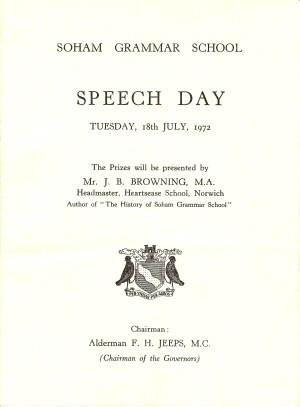 |
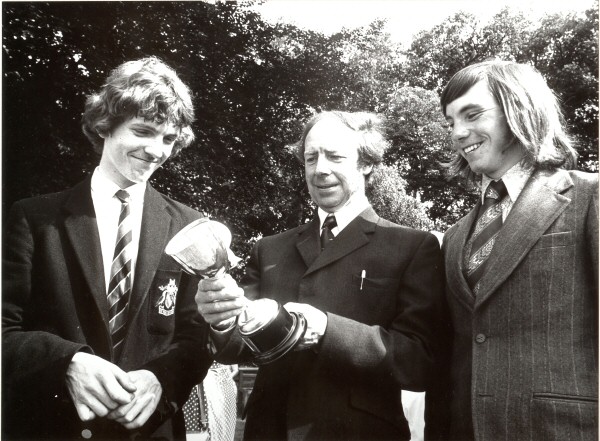 1972 - Final SGS Prizegiving: Simon Thornhill - JB - Bruce King |
At this stage I am reminded of the lady who was driving towards Wimbledon to watch the tennis championships and, halted by an incident in front, her car was struck in the rear by a police vehicle. A flustered, red-faced young constable appeared at her window to say “I am very sorry, madam” to which she replied “So you should be” then added sweetly “Tell me, how do you stop when I’m not here?”
A few more thoughts before I do stop. A usually hackneyed phrase but I mean every word of it. I must pay tribute - to Roger Lane who did so much to take on the running and planning beforehand for these reunions - and now to the present team, including Frank who has contributed much to the running of this reunion and provided the visual aids despite my technical incompetence. If you have not yet visited the SGS website, please do so – it is an amazing compilation.
There was a minister of the Scottish Kirk whose sermons were long and boring, and on the Sunday of which I tell, even more than usual. In the congregation, as was their wont, sat Aggie and Morag. Aggie was slightly hard of hearing, so she leaned over and whispered “Morag, has no the Minister finished?” “Oh aye” said Morag “he’s finished but he has nae stopped.”
I intend to do so. Tomorrow will be St Francis’ Day – how appropriate that I should have the opportunity to once more recall Francis Catala, a member of staff who made his own individual contribution to this school, a charming and very close friend. With him and the ebullient Peter Taylor, what better companions and friends could I have had?
Francis and Peter are now dead and like those of you who knew them, I feel the loss deeply.

1951 - Francis Catala, John Browning and RAT
images: from SG archive or Haslam, unless otherwise stated
page 12 Oct 2008, last updated 14 Nov 10
